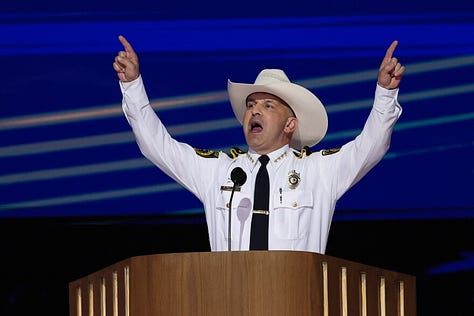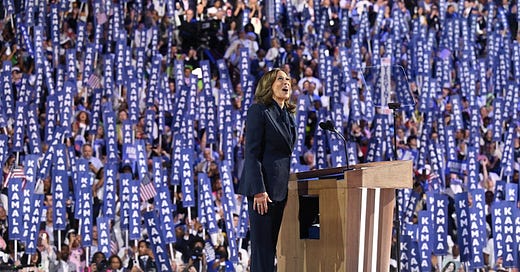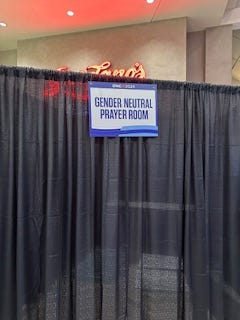I can’t believe that it has only been a month since “the Switch,” and two months since Biden humiliated himself in the debate. All summer, the heads of Democrats were spinning, but they somehow got them screwed on right. The result was a pitch-perfect convention, an inspiring nominee, and a good shot at winning in November.
But as both Obamas and both Clintons warned, this is still likely to be a close election. In the past, Democrats have had a tendency to toggle between despair and complacency. This time, I sense they will ring doorbells instead of wringing their hands when Kamala Harris has a bad week.
I’ve attended 20 political conventions since 1976 — every Democratic convention and all but three Republican conventions (1984, 2004 and 2024) — and I have never seen more enthusiasm and unity.
Chicago ‘24 was also the best-run convention I’ve covered, not logistically (delays pushed Joe Biden, Barack Obama and Tim Walz out of primetime) but in terms of doing what it takes to win. This was clear in every theme (“freedom,” “patriotism,” “common sense,” “Do something!”“We’re not going back!”), every speech (on labor, reproductive rights, the border, and national security), and every video (I especially liked the ones on January 6th and Doug Emhoff). Democrats bedeviled in the past by identity politics and woke excesses united around a woman of blended ethnicity from a blended family whose mother told her: “Never let anyone tell you who you are. You show them who you are.”
The three moments that I hope become ads:
—UAW president Shawn Fain leading a chant: “Trump’s a scab!”
—Texas sheriff Javier Salazar, in uniform, saying Trump blew up the bipartisan immigration bill.
—Harris saying: “I will ensure America always has the strongest, most lethal fighting force in the world.”



Until recently, it seemed we’d be sitting shiva in Chicago, as James Carville put it. The otherwise savvy, experienced people who stuck with Biden forgot the point of a political party. Ever since they sprung up in the 1790s (over the fierce opposition of George Washington), parties have had only one purpose: To win. If the good guys do, lots of good things follow. Concerns for the tender feelings of a fine president are irrelevant to the business at hand.
I thought of that this week when I passed Chicago’s Blackstone Hotel. My parents were married there in 1952, the same year they worked together on Adlai Stevenson’s first presidential campaign. This is the same hotel where in 1920 a group of Republican Party bosses gathered in a “smoke-filled room” to nominate Warren G. Harding for president.
Harding turned out to be a lousy president, surrounded by crooks. But at the time, the bosses knew what they were doing, just as those of us pushing Biden off the ticket knew what we were doing. Harding and Calvin Coolidge faced James Cox and a pre-polio Franklin D. Roosevelt, who made a damaging gaffe during the fall campaign worse than anything Harris did in 2019. (FDR falsely claimed he had written the Haitian constitution, then falsely denied having said so). Harding won big.
Twelve years later, FDR re-made himself from “Feather-Duster” Roosevelt — derided as weak by H.L. Mencken, Walter Lippmann and almost all of the other pundits of the time — into the man we know. After being nominated on the fourth ballot, FDR flew to Chicago to accept the 1932 nomination in person, electrifying the convention as he offered “a new deal for America.”
Harris has a ways to go before she’s an FDR-style transformational president, but she’s made a terrific start. While most of the credit goes to her and her senior staff, who played error-free ball, I’d like to also give a shout-out to the City of Chicago, which foiled pro-Palestinian protesters who had hoped mass arrests would arouse sympathy and spark larger demonstrations.
After the convention, I learned from Chicago sources how the city kept the lid on. It wasn’t just that the numbers of protesters were smaller than expected; the authorities applied highly-effective crowd control tactics. Instead of cars or horses, police used bicycles to block streets when violent outside activists tried to move beyond the designated protest areas. The bike approach mostly worked to quell disturbances, but some protesters did manage to break through a fence, which led the Secret Service to block several entrances to the United Center (thereby delaying the opening on the first night by an hour and delaying Biden’s speech until after prime time). Several news organizations reported that there were “dozens of arrests” that night and later in the week.
Not true. In fact there were zero arrests of pro-Palestinian protesters in Chicago. Instead, police opted for “cite and release,” where a few dozen protesters were briefly detained on the scene, issued citations for disorderly conduct and other minor offenses and given a summons to court. Because most of the offenders were from outside Chicago, few expect them to show up for their court appearances, which is fine with the authorities. The point was to deprive protest leaders of the arrests they needed to put fuel on the fire.
On Thursday, I covered a crowded press conference just outside the United Center in which pro-Palestinian protest leaders angrily complained that a Georgia state legislator — who had spent the night sleeping on a sidewalk near the hall — was not allowed to speak to the convention. Imagine if they were objecting to the arrest of dozens or hundreds of protesters stripped of their constitutional rights and jailed in dank cells. Thanks to clever and humane planning, we didn’t hear a peep about that.
So much for the whole Chicago ’68 thing. Let’s go through a few other conventions. In 1976, Carter lost late primaries to Jerry Brown and Frank Church and alienated the old guard Democratic leaders he needed moving forward. (Carter, who turns 100 on October 1, is determined to live long enough to vote for Harris). In 1980, I watched Ted Kennedy’s challenge to Carter rip the party apart, and in 1984, Walter Mondale’s lackluster convention presaged his defeat at the hands of Ronald Reagan. In terms of excitement, the only recent conventions that rival this one are Bill Clinton’s in 1992 and Barack Obama’s in 2008. Both led to big victories in November but because they were the unsurprising climaxes to long primary campaigns they weren’t as fresh as this one, and they carried no catharsis.
The aftermath of Chicago was slightly worrying. I have no idea what RFK Jr.’s endorsement of his fellow entitled liar will do to the race. My guess is, not much. Within a week or two, only addled conspiracists will remember Bobby, who will now become just another third party loser, though one with more problems than usual at the Christmas table. (I spoke to two Kennedys in Chicago who were appalled). But before you stop paying attention to Kennedy altogether, read Kurt Andersen’s new Atlantic story about Bobby being his coke dealer when they were Harvard undergraduates. Trump has proposed executing drug dealers, though perhaps the statute of limitations has run on RFK Jr.’s years in the business, when he hooked his brother, David, on heroin, which led to a fatal overdose.
P.S.: Bobby claimed the barbecued dog he is holding in a photo from South Korea — published in Vanity Fair — is really a barbecued goat. He’s lying. I’ve seen the email he sent with the photo, where he says it’s at a restaurant in South Korea that serves dog.
After accepting Kennedy’s endorsement, Trump showed why he remains such a threat. His speech in Glendale, Arizona offered a preview of what he will do in the debate on September 10. He’ll echo his ads by accusing Harris of being a liar and flip flopper. He’ll say she’s lying by saying that Trump wants to raise taxes and cut Social Security, when she’s the one who will do that; lying by denying that she let millions of illegal immigrants get benefits; lying by connecting Trump to Project 2025, which Trump insists he’s “never heard of”; lying by saying she never favored making illegal immigrants legal; flip-flopping on fracking, which Trump wrongly claims employs 500,000 people in Pennsylvania (the real number is 24,000); flip-flopping on Medicare, where he claims she cast the tie-breaking vote to cut $266 billion from “your Medicare”. And on and on — a firehose of accusations of lying while uttering dozens more lies himself.
In a future column, I’ll offer ideas for fighting back. (Hint: counter attack). But for now, whatever post-convention bounce Kamala Harris gets, she’s set up a trampoline to propel a new, pragmatic, united and visionary party — with a strong bench — into the second quarter of the 21st Century.
Note: My new book, American Reckoning: Inside Trump’s Trial—and My Own, out on October 22, is much more than what you read in these pages last spring. It’s part-memoir, part barbed trial diary and part cri de coeur for democracy, with war stories from my interviews with presidents and new details about Nancy Pelosi’s brilliant efforts to get Biden to stanbd down. See blurbs from Stephen Colbert, Lawrence O’Donnell, Judge George Grasso and more. Please pre-order it!







It was an incredible and inspiring week at the DNC. This excitement for Kamala Harris at the DNC is unlike anything I’ve ever seen in politics.
Kamala and Tim are the right ticket to lead us into our next American chapter. Period.
Let’s work together to get this done WITH JOY!
That's why I ENJOY wearing this "Kamala removes orange stains" t-shirt everywhere I go 🤣 👇
libtees-2.creator-spring.com/listing/votek
MAGAs are upset those at the DNC were filled with hope, JOY and enthusiasm. They are jealous!
Can’t wait to say “Madam President.” I just love when history is being made!
Jonathan is entirely right here. And I do agree that the Democratic party adults were also entirely right to ‘convince’ Biden to get out. I did object to some of, language used to characterize Biden as he was obviously in mid passage,toward a decision. Anyone who has served the country as ling and as well as he had does,not deserve to be insulted. But this piece is in every respect’vastly superior to the piece written yesterday by the Economist. That piece is a long diatribe about why doesn’t Harris’do what they want and ‘clarify’ her policy stances so they can then shred them. Her obligation right now is to win in a battle against the most dangerous man ever to run for the presidency.